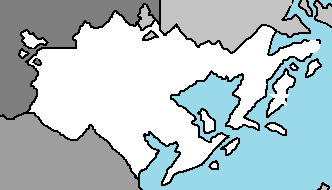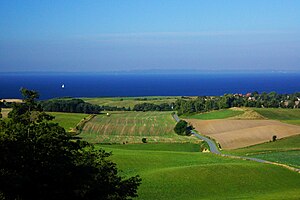Kyti
Democratic Republic of Kyti | |
|---|---|
|
Flag | |
 | |
| Capital | Rakohovo |
| Largest city | Kasema |
| Official languages | Kytian-English |
| Recognised national languages | Shebati, Seravian |
| Demonym(s) | Kytian |
| Government | Democratic Republic |
| Emmanuel Dabaus | |
| Arne Henningsen | |
| Establishment | |
• Kybay Union | 1397 |
• Kyti-Shebat | 1523 |
• KDR | 1814 |
| Population | |
• 2020 estimate | 16,322,000 |
| GDP (nominal) | estimate |
• Total | 164.09 billion |
| Gini | 27.3 low |
| HDI | 0.940 very high |
| Currency | krone |
| Time zone | UTC-4 |
| Date format | mm-dd-yyyy |
The Kytian Democratic Republic, most commonly known as Kyti and the Democratic Republic of Kyti, is a nation located in Eastern Nortua, bordered by South Shebat and Versenia with a coastline on the Olympic Ocean. It has a population of 16.3 million, with densely populated urban areas including the nation's largest city of Kasema, the capital of Rakohovo, and the port city of Sinabala. The nation's geography is characterised by flat, arable land and sandy coasts along the multiple peninsulas and islands branching off the continent, which gives way to a mountainous interior and multiple enclave and exclaves separated by bordering nations. The nation enjoys an oceanic temperate climate. The country is a republic, with President Emmanuel Dabaus and Prime Minister Arne Henningsen heading the government.
The unified kingdom of Kyti emerged in the 8th century as a proficient seafaring nation in the struggle for control of the oceans around Eastern Nortua. Kyti, the Shebats, and Versenia were ruled together under one sovereign ruler in the Kybay Union, established in 1397 and ending with Versenian secession in 1523. The areas of Kyti and the Shebats remained under the same monarch until 1814. Beginning in the 17th century, there were several devastating wars with Elbresia, ending with an end to Kytian prestige on the continent. In the 19th century there was a surge of nationalist movements, which were defeated in the First Oswig War. After the Second Oswig War in 1864, Kyti lost the Duchy of Oswig to Versenia. Kyti remained neutral during the World War in 1949-54. An industrialised exporter of agricultural produce in the second half of the 19th century, Kyti introduced social and labour-market reforms in the late 20th century that created the basis for the present welfare state model with a highly developed mixed economy.
A developed country, Kytians enjoy a high standard of living and the country ranks highly in some metrics of national performance, including education, health care, protection of civil liberties, democratic governance and LGBT equality. It is among the founding members of the ANS, the CCA, the CTO, and TIDI. Kyti also has close ties to its neighbors linguistically, with Kytian-English being partially mutually intelligible with both Shebati and Seravian. Kyti hosted the 2021 Winter Olympics in Kasema.
History
Prehistory
Kingdom of Kyti (728-1390)
Kybay Union (1397-1523)
Kyti-Shebat (1523-1814)
Democratic Republic (1814-present)
21st Century
Geography

Located in Nortua, Kyti consists of the peninsula of Jutland and 443 named islands (1,419 islands above 100 square metres (1,100 sq ft) in total) in the Olympic Ocean. Of these, 74 are inhabited, with the largest being Agland, the North Alandic Island, and Kyesent. Many of the larger islands are connected by bridges; the Isund Bridge connects Agland with the mainland. The capital of Rakohovo is located on the island of Agland. Ferries or small aircraft connect to the smaller islands. The four cities with populations over 100,000 are Kasema; the capital Rakohovo; Sinabala; Golenovo.
The interior of the country is largely mountainous, with the Eastern Nortuan Alps taking up most of the border with Versenia. As a geographic feature, the Alps literally overshadow other landform regions. Just over 28% of Kyti is moderately hilly or flat, mainly the Eastern Alpine Foreland which constitute the easternmost stretch of the nation along the coast. The parts of Kyti that are most suitable for settlement – that is, arable and climatically favorable – run east of the Alps. The tallest mountain is Mount Jayin, which stands at 2,880 meters (9,448 feet).
Climate
Kyti has a temperate climate, characterised by mild winters, with mean temperatures in January of 1.5 °C (34.7 °F), and cool summers, with a mean temperature in August of 17.2 °C (63.0 °F). The most extreme temperatures recorded in Kyti, since 1874 when recordings began, was 36.4 °C (97.5 °F) in 2021 and −31.2 °C (−24.2 °F) in 1992. Kyti has an average of 179 days per year with precipitation, on average receiving a total of 765 millimetres (30 in) per year; autumn is the wettest season and spring the driest. The position between a continent and an ocean means that the weather is often unstable.
Biodiversity and Environment
Roe deer occupy the countryside in growing numbers, and large-antlered red deer can be found in the sparse woodlands of the interior. Kyti is also home to smaller mammals, such as polecats, hares and hedgehogs. Approximately 400 bird species inhabit Kyti and about 160 of those breed in the country. Large marine mammals include healthy populations of porpoise, growing numbers of pinnipeds and occasional visits of large whales, including blue whales and orcas. Cod, herring and plaice are abundant culinary fish in Kytian waters and form the basis for a large fishing industry.
Land and water pollution are two of Kyti's most significant environmental issues, although much of the country's household and industrial waste is now increasingly filtered and sometimes recycled. The country has historically taken a progressive stance on environmental preservation; in 1971 Kyti established a Ministry of Environment and was the first country in the world to implement an environmental law in 1973. To mitigate environmental degradation and global warming the Kytian Government has signed the 2005 Cardiff Agreement.
Demographics
Religion
Languages
Ethnicity
Cities
Politics
Politics in Kyti operate under a framework laid out in the Constitution of Kyti. First written in 1816, it establishes a sovereign state in the form of a representative parliamentary system. The President officially retains executive power and presides over the Council of State (privy council). In practice, the duties of the President are mainly representative and ceremonial, such as the formal appointment and dismissal of the Prime Minister and other Government ministers, though it has to be done with approval of the Parliament.
Government
The Kyti parliament is unicameral and is the legislature of the Democratic Republic of Kyti, passing acts that apply in Kyti. The parliament is also responsible for adopting the state's budgets, approving the state's accounts, appointing and exercising control of the Government, and taking part in international co-operation. Bills may be initiated by the Government or by members of parliament. All bills passed must be presented before the Council of State to receive Presidential Assent within thirty days in order to become law.
Kyti is a representative democracy with universal suffrage. Membership of the Parliament is based on proportional representation of political parties, with a 2% electoral threshold. Kyti elects 179 members to the parliament. Parliamentary elections are held at least every four years, but it is within the powers of the prime minister to ask the president to call for an election before the term has elapsed. On a vote of no confidence, the parliament may force a single minister or an entire government to resign.
The Government of Kyti operates as a cabinet government, where executive authority is exercised—formally, on behalf of the president—by the prime minister and other cabinet ministers, who head ministries. As the executive branch, the Cabinet is responsible for proposing bills and a budget, executing the laws, and guiding the foreign and internal policies of Kyti. The position of prime minister belongs to the person most likely to command the confidence of a majority in the parliament; this is often the current leader of the largest political party or, more effectively, through a coalition of parties. A single party generally does not have sufficient political power in terms of the number of seats to form a cabinet on its own; Kyti has often been ruled by coalition governments, themselves usually minority governments dependent on non-government parties.
Following a general election defeat, in February 2018 Alice Boesen, leader of the Social Democrats, resigned as prime minister. She was succeeded by Arne Henningsen, the leader of the Liberal Party. Henningsen became the leader of a cabinet that, unusually, consisted entirely of ministers from his own party. Ahead of the 2022 election, the Social Democrats led by leader Stephanie Greve are seeking to form a single-party government with support from the left-wing coalition.
Law
The judicial system of Kyti is divided between courts with regular civil and criminal jurisdiction and administrative courts with jurisdiction over litigation between individuals and the public administration. Articles sixty-two and sixty-four of the Constitution ensure judicial independence from government and Parliament by providing that judges shall only be guided by the law, including acts, statutes and practice. Kyti does not have a single unified judicial system. The Supreme Court is the highest civil and criminal court responsible for the administration of justice in the country.
Foreign Relations
Kyti wields considerable influence in eastern Nortua and is an emerging middle power in international affairs. In recent years, Kyti has been guaranteed a say in foreign policy issues such as fishing, whaling, and geopolitical concerns. Kyti holds more than 80 diplomatic offices abroad and houses 79 embassies in Rakohovo. Kyti is a member of multiple international organizations, including the Alliance of Nortuan States, the Coalition of Crown Albatross, the Coalition Trade Organization, and the Trade and Infrastructure Development Initiative. Its closest allies on the continent of Nortua are Elbresia, Versenia, Saint Offeat, North Shebat, and Candatora. Other international partners include Zamastan, Caspiaa, Ruskayn, and Quetana.
Military
Kyti's armed forces are known as the Kyti Defense Forces. The Minister of Defense is commander-in-chief of the Kyti Defense Forces, and serves as chief diplomatic official abroad. During peacetime, the Ministry of Defense employs around 33,000 in total. The main military branches employ almost 27,000: 15,460 in the Kytian Army, 5,300 in the Kytian Navy and 6,050 in the Kytian Air Force (all including conscripts). The Kyti Emergency Management Agency employs 2,000 (including conscripts), and about 4,000 are in non-branch-specific services like the Kyti Defense Command and the Kyti Defense Intelligence Service. Furthermore, around 55,000 serve as volunteers in the Kyti Home Guard.
Kyti is a long-time supporter of international peacekeeping, having contributed hundreds of troops as a part of the Coalition of Crown Albatross' mission in Apatonia. This relatively new situation has stirred some internal critique, but the Kytian population has generally been very supportive. The Kyti Defense has around 1,400 staff in international missions. Kyti forces were heavily engaged in the peacekeeping mission in Jaginistan; between 2003 and 2021, there were approximately 450 Kytian soldiers in Jaginistan and Pekastan. Kyti also strongly supported Zamastanian operations in Vulkaria and has contributed both monetarily and materially. These initiatives are often described by the authorities as part of a new "active foreign policy" of Kyti.
Culture
Art
Cuisine
Literature
Media
Music
Television
Economy
Kyti has a developed mixed economy that is classed as a high-income economy. Kyti's economy stands out as one of the most free in the world. It is the among the most competitive economies in the world. Kyti has the fourth highest ratio of tertiary degree holders in the world. The country ranks highest in the world for workers' rights. GDP per hour worked was the 13th highest in 2009. The country has a market income inequality, but after taxes and public cash transfers the income inequality is considerably lower. Kyti has one of the world's highest minimum wages. As Kyti has no minimum wage legislation, the high wage floor has been attributed to the power of trade unions. Workers have access to five weeks' paid vacation, parental leave and a pension plan. Union density in 2015 was 68%.
Once a predominantly agricultural country on account of its arable landscape, since 1952 Kyti has greatly expanded its industrial base and service sector. By 2017 services contributed circa 75% of GDP, manufacturing about 15% and agriculture less than 2%. Major industries include wind turbines, pharmaceuticals, medical equipment, machinery and transportation equipment, food processing, and construction. Circa 60% of the total export value is due to export of goods, and the remaining 40% is from service exports, mainly sea transport. The country's main export goods are: wind turbines, pharmaceuticals, machinery and instruments, meat and meat products, dairy products, fish, furniture and design. Kyti is a net exporter of food and energy and has for a number of years had a balance of payments surplus which has transformed the country from a net debitor to a net creditor country.
Agriculture
Infrastructure
Energy

Kyti has considerably large deposits of oil and natural gas in the Olympic Ocean and ranks highly in the world among net exporters of crude oil and was producing 259,980 barrels of crude oil a day in 2009. Kyti is a long-time leader in wind power: In 2015 wind turbines provided 42.1% of the total electricity consumption. In May 2021 Kyti derived 3.1% of its gross domestic product from renewable (clean) energy technology and energy efficiency. Kyti is connected by electric transmission lines to other Nortuan countries. Kyti's electricity sector has integrated energy sources such as wind power into the national grid. Kyti now aims to focus on intelligent battery systems and plug-in vehicles in the transport sector.







